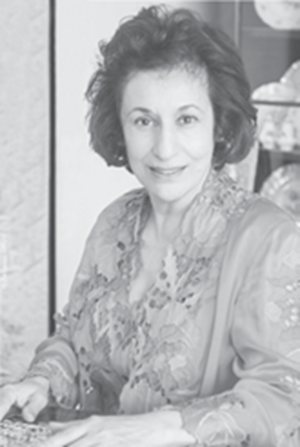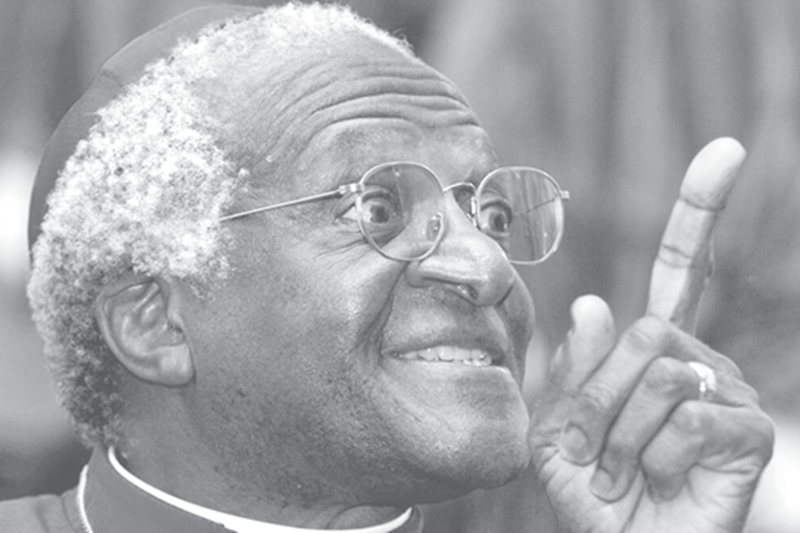Our dear friend and mentor Zerbanoo Gifford pays tribute to the great humanitarian of our times, Bishop Desmond Tutu, who received the Nobel Peace Prize in 1984 for his work fighting the inhuman apartheid regime. This iconic figure dedicated his life to the fearless and relentless fight against all forms of injustice…
The death of Bishop Desmond Tutu at the age of 90 was received with great sorrow by Zerbanoo Gifford and her team at the ASHA Cen- tre, the interfaith, intercul- tural educational centre in the Forest of Dean, Glouc- estershire, England.
The Bishop received the Nobel Peace Prize in 1984 for his work fighting apart- heid but this iconic figure also dedicated his life to the relentless fight against all forms of injustice. He will be remembered for the peace and reconcilia- tion committee initiated by Mandela in South Africa, which Tutu chaired with such compassion.
But he will also be re- membered for the way he challenged Mugabe, an- other African, for the un- told horrors in Zimbabwe and those involved in the bloodshed in Northern Ire- land and Israel and the cru- elty against the Muslims in Myanmar. Tutu said it as it was, he was brave and a man of integrity.
Anti-apartheid Struggle
Bishop Tutu was one of ASHA Centre’s most loved and admired patrons and a wise friend for Zerbanoo Gifford, the founder of the ASHA Centre, who admired his pure goodness and courage.
Zerbanoo first met Bishop Tutu at Saint Mar- tin’s in the Field church in Trafalgar Square, where many had found comfort before standing outside South Africa House, also in Trafalgar Square, where at least one person stood in vigil until the day Mandela was released and the world saw the end of the barbaric apartheid days.
Zerbanoo was very ac- tive in the anti-apartheid movement back then. She was inspired by Desmond Tutu, Govan Mbeki and Frene Ginwalla (the indomitable feminist and one of the leaders of the anti-apartheid movement who ran the ANC office in London). Frene went on to be the first speaker of the South African Parliament. She was a great woman and someone Zerbanoo had written about in her first book, ‘The Golden Thread, Asian experience in post Raj Britain’. Zerbanoo recalls being given the honour to speak at Trafalgar Square to hundreds of thousands of anti-apartheid protesters and then being chosen with the late Bishop Trevor Huddlestone, a close friend of Bishop Tutu, to present the People’s Petition to Margaret Thatcher at No. 10 Downing Street, calling for fully mandatory sanctions against the apartheid regime in South Africa and the release of Mandela. It was one of the pivotal moments of Zerbanoo’s life as she knew that apartheid would come to an end, as all evil eventually does, when there is a ground swell to stop such indignities against innocent people.
The Rainbow People
Bishop Desmond Tutu said it as it was. He was brave and a man of integrity. He will also be remembered for the way he challenged Robert Mugabe, another African, for the untold horrors in Zimbabwe and those involved in the bloodshed in Northern Ireland and Israel and the cruelty against the Muslims in Myanmar
 The next time Tutu and Zerbanoo met she said a prayer with Bishop Tutu to celebrate the work of the South African Memorial Trust, which both were patrons of — a charity work- ing for the education of black South Africans deprived of education during the apartheid years. The mood was very different. “Tutu’s distinctive giggle and sheer magnetic person- ality made the event memorable. He danced around the church, which was filled with the good and the great. His sheer vitality and joy of living was infectious,” re- calls Zerbanoo.
The next time Tutu and Zerbanoo met she said a prayer with Bishop Tutu to celebrate the work of the South African Memorial Trust, which both were patrons of — a charity work- ing for the education of black South Africans deprived of education during the apartheid years. The mood was very different. “Tutu’s distinctive giggle and sheer magnetic person- ality made the event memorable. He danced around the church, which was filled with the good and the great. His sheer vitality and joy of living was infectious,” re- calls Zerbanoo.
Zerbanoo also recalls trying to keep up with Bishop Tutu dancing around the church and telling him of her dream of starting the ASHA Centre, although she had no idea where it would be or when it would happen. Tutu told her to have faith, as God made miracles hap- pen. Some years back, al- though ill with cancer, Tutu graciously wrote some beau- tiful words about Zerbanoo at the back of her biography written by New Zealand editor Farida Master titled ‘An Uncensored Life’.
He stated that Zerbanoo’s commitment to peace, to young people and to creating a better world is evident from her track record. “As the first Asian woman in modern British politics elected as a Liberal councillor, her vision led to alternative ways to make a real difference and she trod that path regardless of the challenges. Today we can see that journey has borne fruit and give thanks for all she stands for” wrote Bishop Tutu of Zerbanoo.
Besides being a great soul who loved people, Tutu was known for calling South Africans “the rainbow peo- ple”. He sent his book, ‘The Rainbow People of God’, to Zerbanoo and wrote inside a short thank you for Zerbanoo’s solidarity and cam- paigning against apartheid during those terrible years. Zerbanoo, known for her work across communities and faiths, admits to always having a fascination with rainbows since a young girl when her father, Bailey Irani, convinced her that there was something wonderful at the end of the rainbow. Maybe a pot of gold!
She recalls that when the ASHA Centre was finally opened, her friends from the UK Zoroastrian community and other communities came to bless the centre and have a wonderful Parsi meal. Zerbanoo said to the invited guests that if her father, Bailey Irani, who many knew as the big-hearted founder president of the World Zoroastrian Organisation and a trustee and President of ZTFE was happy with what she had done with her life, they would see a rainbow. No rainbow appeared.
But as the group left in their bus back to London, one of the guests, the European member of Parliament from the West of England, Glyn Ford, rang from his car and said look up there are two rainbows over the ASHA Centre. Zerbanoo said she felt that one was for her Dad and the other for Tutu, who had inspired so much of her humanitarian work.

